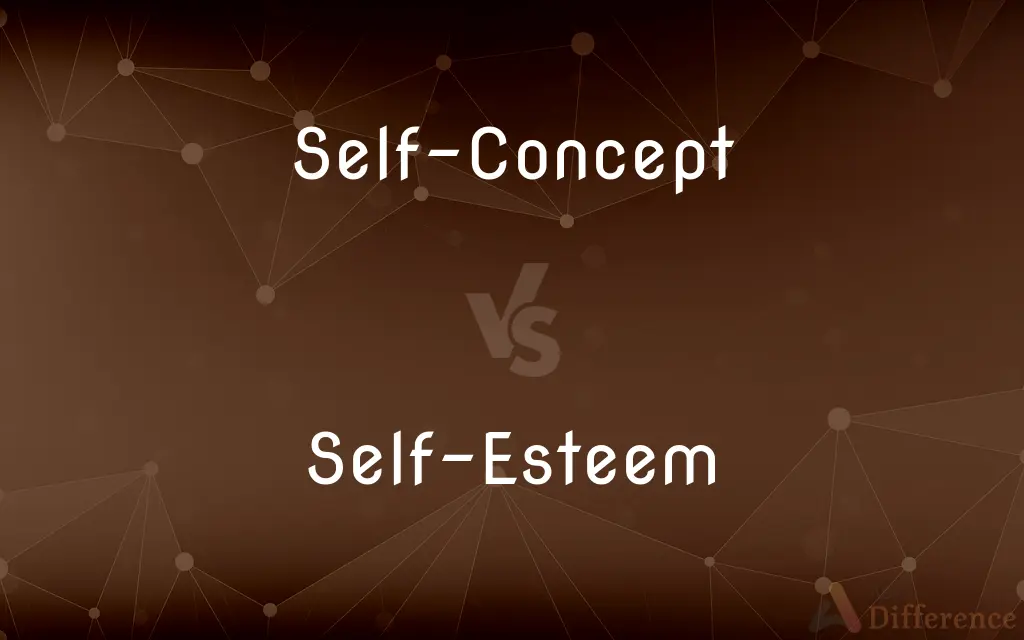Self-Concept vs. Self-Esteem — What's the Difference?
By Tayyaba Rehman — Published on October 24, 2023
Self-Concept is one's perception of oneself, encompassing self-image and identity. Self-Esteem refers to one's value and worthiness, impacting confidence and attitude.

Difference Between Self-Concept and Self-Esteem
Table of Contents
ADVERTISEMENT
Key Differences
Self-Concept encapsulates one’s overall perception and image of themselves, embedding attributes like roles, personality, and skills. In contrast, Self-Esteem, while related, zeros in on how much individuals value themselves, reflecting their inner confidence and worthiness. These two aspects, although interwoven, distinctly influence an individual’s outlook and behavior.
Where Self-Concept dives into the comprehensive understanding and awareness of self, involving aspects like personal skills, attributes, and roles, Self-Esteem takes a different path by exploring one’s judgment about their own worth and value. Self-Concept maps the terrain, while Self-Esteem gives the emotional and value-laden perspective of that terrain.
Further, Self-Concept doesn't always dictate positive or negative aspects, as it’s an objective view of oneself. Contrastingly, Self-Esteem explicitly involves a positive or negative valuation, with high self-esteem indicating a positive self-view and low self-esteem showing a more critical perspective. Self-Concept can be accurate or distorted, while Self-Esteem is inherently evaluative.
An individual’s Self-Concept might encompass their view as a skilled artist, which doesn’t inherently carry an emotional or value judgment. Simultaneously, Self-Esteem plays a pivotal role in determining whether this individual sees their artistic ability as something valuable and worthy, thereby influencing their confidence and motivations in this domain.
In essence, while Self-Concept aligns with the cognitive or thinking component of self, interpreting one’s identity and attributes, Self-Esteem sails towards the emotional realm, deciding how much one appreciates and values themselves. Although intertwined, these concepts present diverse lenses through which one views oneself.
ADVERTISEMENT
Comparison Chart
Definition
Self-Concept involves perceptions of oneself.
Self-Esteem involves valuations of oneself.
Focus
Self-Concept focuses on self-perception.
Self-Esteem focuses on self-worth.
Role
Self-Concept plays a descriptive role.
Self-Esteem plays an evaluative role.
Impact
Self-Concept shapes identity.
Self-Esteem influences confidence.
Example
My Self-Concept involves seeing myself as an artist.
My Self-Esteem reflects how I value my artistic skills.
Compare with Definitions
Self-Concept
It reflects one’s awareness and understanding of oneself.
A robust Self-Concept enables her to understand her motivations.
Self-Esteem
It reflects how much one values and appreciates oneself.
His Self-Esteem suffers when he underperforms.
Self-Concept
Self-Concept encompasses one’s self-perceptions and self-image.
His Self-Concept as a leader shaped his actions in the team.
Self-Esteem
Self-Esteem denotes one’s appraisal of self-worth.
High Self-Esteem enhances her courage to try new things.
Self-Concept
Self-Concept embodies one’s views about personal attributes.
Her Self-Concept includes seeing herself as compassionate and patient.
Self-Esteem
Self-Esteem influences one’s confidence and self-acceptance.
Her Self-Esteem stabilized due to positive affirmations.
Self-Concept
It is a cognitive framework encompassing self-knowledge.
His Self-Concept incorporates both his strengths and weaknesses.
Self-Esteem
It represents an emotional evaluation of oneself.
His Self-Esteem thrives on positive self-talk and achievements.
Self-Concept
Self-Concept assimilates one’s roles, skills, and identity.
Her Self-Concept evolved after becoming a mother.
Self-Esteem
Self-Esteem can enhance or impair one’s mental wellbeing.
Consistent rejection took a toll on her Self-Esteem.
Self-Concept
The mental image or perception that one has of oneself.
Self-Esteem
Pride in oneself; self-respect.
Self-Concept
The view of one's self; self-image.
Self-Esteem
Confidence in one's own worth; self-respect.
Self-Concept
One's conception of the kind of person one is.
Self-Esteem
The holding a good opinion of one's self; self-complacency.
Self-Esteem
A feeling of pride in yourself
Self-Esteem
The quality of being worthy of esteem or respect;
It was beneath his dignity to cheat
Showed his true dignity when under pressure
Common Curiosities
What encompasses Self-Concept?
Self-Concept encompasses self-perceptions, self-image, and self-awareness.
How is Self-Concept formed?
Self-Concept is formed through experiences, reflections, and self-perception over time.
How is Self-Esteem manifested?
Self-Esteem manifests as a sense of worth, impacting confidence and self-acceptance.
What influences Self-Esteem?
Self-Esteem can be influenced by internal and external validation, achievements, and self-talk.
Can high Self-Esteem always be beneficial?
Not always. Excessively high Self-Esteem may lead to overconfidence or arrogance.
Can Self-Concept impact behavior?
Yes, Self-Concept can shape behaviors, actions, and reactions.
Can Self-Concept change?
Yes, Self-Concept can evolve with new experiences, insights, and personal growth.
Is Self-Concept related to personality?
Yes, Self-Concept is closely related to and influenced by one’s personality.
Is Self-Esteem linked to mental health?
Yes, Self-Esteem can directly impact and be influenced by mental health.
Is Self-Esteem always static?
No, Self-Esteem can fluctuate based on experiences, thoughts, and social dynamics.
Does Self-Concept influence career choices?
Yes, Self-Concept can significantly impact career choices and pathways.
How are Self-Concept and Self-Esteem related?
While Self-Concept involves self-perception and identity, Self-Esteem relates to valuing oneself, both influencing one’s self-view.
How can one enhance Self-Esteem?
Enhancing Self-Esteem involves positive self-talk, achieving goals, and practicing self-compassion.
Can Self-Concept be inaccurate?
Yes, Self-Concept can sometimes be based on distorted self-perceptions.
Does society impact Self-Esteem?
Yes, societal norms and feedback can significantly impact Self-Esteem.
Share Your Discovery

Previous Comparison
Political Science vs. Politics
Next Comparison
Dependant vs. DependentAuthor Spotlight
Written by
Tayyaba RehmanTayyaba Rehman is a distinguished writer, currently serving as a primary contributor to askdifference.com. As a researcher in semantics and etymology, Tayyaba's passion for the complexity of languages and their distinctions has found a perfect home on the platform. Tayyaba delves into the intricacies of language, distinguishing between commonly confused words and phrases, thereby providing clarity for readers worldwide.












































